- Home
- Hannah Alexander
Double Blind Page 20
Double Blind Read online
Page 20
As Sheila obliged, she couldn’t help wondering again how many children were affected by this terror of the wolf.
Chapter Twenty-Eight
S ometime in the dark hours of early morning, I awake with a start, falling, crying out, grasping through the black air for something that vanishes with my return to consciousness. I hit the floor with an impact that knocks away my breath.
I no longer soar with the spirits—I am unable to feel my own spirit. Something tickles my cheek and I claw at it, only to find tears trickling down my face. Perspiration drips from my body.
Invisible spirits jeer at me, surrounding me. I huddle against the side of my bed, stiff with terror. They are waiting for me. One move, one wrong sound, and they will come for me. I squeeze into myself, ducking my head between my bent knees. The terror is a familiar feeling, yet I have no memory of this ever happening before.
I cringe in this cowardly way for endless moments, waiting for the spirits to stop hovering around me. I shouldn’t be afraid. Don’t I command those spirits? Don’t I control them? With my knowledge, haven’t I summoned the most powerful spirit of all, the spirit of the wolf?
Gradually, I grow aware of a whisper that echoes through the blackness—a childish whisper, like a little boy at play:
“Racing Deer is running, racing, Racing Deer is running far from here.”
“Who’s there?” I call out, my voice quivering so I barely recognize it.
“Racing…racing…racing…
“Running…running…running…
“No,” I whisper.
The voice grows louder: “Racing Deer is running, racing, running. Racing Deer is running far from here.”
“No!”
Louder: “Racing…racing…racing…
“Running…running…running…
The voice echoes around me, chanting the same words over and over, growing louder, deeper, stronger. I cover my ears, but the chant pounds through my head.
“RACING…RACING…RACING…”
I whimper, then groan, but the sounds grow louder, closer, swelling and throbbing through my brain.
I find myself repeating the words as if I have no will of my own.
As if I haven’t for a long time.
“Racing deer is running…running…running…”
My own voice echoes in my ears, and I discover that this makes the other voice fade.
I fall silent.
The pain slowly goes away. Soft echoes of the child’s voice dwindle and die. With them go the hovering spirits, drifting off with the wind.
When I raise my head, the darkness of the room crowds around me, but it’s an empty darkness now.
I pull myself from the floor, still trembling, and sit on the bed. My sheets are drenched.
I swipe at the sweat dripping from my forehead. What’s happening to me? Whose voice was that, and why this sudden attack? Haven’t I served to the best of my ability? This is to be my doorway to riches and ease, and the spirits are supposed to be happy with my work.
Sheila. Spirit of the white woman. She knows things she shouldn’t, things she learned as a child. Has she brought the spirits to hover around me?
Sudden, sharp anger urges me out the front door to glare at the sky. Gusts of cold air catch at my bare arms, and almost…almost I can hear again that voice on the twisting currents of the air.
She has to be stopped. Hasn’t the spirit already warned me about her? And haven’t I resisted what I’ve known needed to be done ever since she arrived?
I go back to my apartment long enough to pull on my night walking clothes, then I set out on my two-mile trek to the hogan.
The death hogan.
Something tickled Preston’s nose. He brushed it away, but it came back. Finally, awake enough to think straight, he realized he wasn’t in his own bed at home; he was staying in the home of his rival for Sheila’s affections.
And then he thought about mice.
He shoved the covers away and leaped from the bed, thinking of plague and viruses and dangerous fevers that could kill before a man could get to help.
Then he remembered, of course, that a doctor slept down the hall. And he realized that the tickle he’d felt on his nose was most likely a corner of his sheet being ruffled gently by the breeze that shot through the room from the open glass door.
He glanced at the other twin bed in the room, and saw the white sheet where the blanket had been thrown back.
“Blaze?” he called softly.
“Shhh!” The command came from the deck.
“What are you doing out there?” Preston stepped to the open door and peered out at the moonlit desert.
“You see anything moving?” came a whisper no more than six inches from his ear.
“What am I supposed to see?”
Blaze raised an arm and pointed west. “That little figure walking away from the school. See it out there? It’s all in white.”
Preston peered into the darkness, and he did, indeed, see a flicker of white. “Could be a dog,” he said, then grinned. “Could be the ghost of the dog that got killed on the road last week.”
“Don’t joke about something like that in a place like this,” Blaze muttered. “It might be too close to the truth.”
“Okay, I give up. Why are we up in the middle of the night spying on people, or ghosts or whatever?”
“Nothing better to do. Couldn’t sleep.”
Now that was strange. Blaze Farmer was rumored to be able to sleep sitting up in class and in church without anybody being the wiser. “What’s wrong?”
Blaze kept watching the desert. “Weird stuff going on around here, kids telling stories about haunted places and ghosts and—”
“You’re letting little kids scare you now? Maybe you’re right, after all. Maybe you should stick to animals.”
Blaze grunted. “You said it. I woke up and heard someone singing, like a little kid. Then that stopped and I heard a door open and close and someone went walking out into the desert.”
“The ghost in white?”
“No, all I saw was a shadow.”
“So there are two ghosts walking out in the desert?”
“Don’t know about no ghosts, but there’s a couple of somethings out there.”
“It might be Tanya running away again, but if she was the one singing, then Sheila sure would’ve heard it. You want me to call Sheila on her cell and see if her houseguest has escaped?”
“Nope.” Blaze stepped to the edge of the deck and looked down, then around, then back at Preston. “You need to stay in Sheila’s good graces, and waking her up in the middle of the night won’t help you none. Besides, I had a little talk with Tanya last night.”
Preston stepped back inside. “I don’t suppose you’ve noticed it’s cold. Come back in. Whoever’s walking in the desert is probably someone we don’t know, and it’s none of our business who wants to take a walk.”
Blaze came back in and slid the door shut silently. “Tanya’s another scared kid. I think you’re right—something’s wrong in this place, and I think Canaan thinks the answer can be found in the medical records.”
“He told you that?”
“He and Sheila were in the clinic until late last night.”
Suddenly, Preston didn’t feel so great. “Tell me about it.”
“So while you were up here working on the finances—”
“Which are coming along nicely—”
“And they were in the clinic with piles of folders stacked around them—”
“And that’s all?”
“That’s all. Anyway, while everybody else kept busy, I finished up my lab work and went to see if I could get something to eat in the cafeteria, which doesn’t keep very long hours.”
“It’s a Navajo boarding school,” Preston said. “You can’t expect this place to be a modern metropolis like Hideaway.”
“Anyway,” Blaze said, shooting him an irritable look, “I saw Tanya talking with this guy w
ho was cleaning up—she told me he was the son of the people killed in the fire and she got me something to eat. We sat and talked until that old lady with the long hair ran us out.”
“That’s Betsy Two Horses. She was here when Sheila was a little girl.”
“Well, I don’t think Tanya’s going to bolt again. I think I convinced her she might’ve died if Canaan and Sheila hadn’t found her when they did.”
“In case you hadn’t noticed, I’ve been buried up to my eyeballs in finances and pie charts ever since we got here.”
“And you thought you’d be scrubbing toilets.”
“My point is, I don’t know what happened to Tanya.”
Blaze gave him a quick rundown of the child’s escape, her rescue, her hospital stay.
“Okay,” Preston said, “did Tanya happen to mention what they tested her for?”
“You’re thinking hemorrhagic fever of some kind,” Blaze said, nodding. “No tests for that in a small hospital. The equipment needed to test for viral infections is too expensive.”
“Plague?”
“That’s fairly characteristic under a microscope, because it isn’t a virus,” Blaze said. “Anthrax would show up, as well, but hantavirus, being a virus, wouldn’t show up under a regular microscope. Find anything strange while you were making that pie chart on your computer?”
“I don’t know, maybe wacky expense sheets, money being used for supplies that weren’t actually delivered, unknown sources of income.”
“What kinds of supplies?”
“Dog food,” Preston said. “But there aren’t any dogs around here.”
“Hmm. Weird, huh? I found some notes in a file for one of the kids I’m supposed to test today,” Blaze said. “Probably written by the woman who was killed in the fire. Wendy Hunt.”
“What did it say?”
Blaze hesitated. “You know, this is confidential information.”
“Of course, but the financial state of the school is also confidential information. Canaan obviously trusts us both to keep our mouths shut.”
“Could be, but it seems to me he’s just desperate.”
“It’s all school business, and in this case I think we need to share as much information as we can.”
“Okay. Looks like Wendy was planning to send blood samples from four different kids to the CDC.”
Preston whistled softly. “The Centers for Disease Control? Big guns.”
“Yep, that’s what her note said. So I figured the CDC would’ve had time to check out that blood and send the reports back.”
“Did you find anything?”
“Nope.” Blaze shook his head in puzzlement. “I was going to tell Canaan about it, but I got tired of waiting for him and Sheila last night. I’ll tell him this morning, and you know that lab? I know how to use it. I can’t wait to run a few more tests here at the school.”
“You drew blood on those particular kids?”
“No, but they’re scheduled to come in for physicals today. I found their files and sent a special request to the teachers.”
“But you don’t know what to test for. If she sent samples to the CDC, then she obviously thought there was something in the blood that she wouldn’t be able to pick up with the equipment here.”
“I said she was planning to send those samples. If they got sent, then nothing must’ve been found out of order. But they might not have gotten sent before she died.” Blaze stared out at the night desert for a moment. “You’re right, I probably won’t find anything, but judging by some of the other notes I saw from Wendy, she was afraid Bob Jaffrey’s illness might be something dangerous to the school. I’ll check those kids tomorrow and see.”
When I reach the hogan, I step in with the knowledge that I am stepping into an altered world. The entrance of a Navajo hogan traditionally faces east, to catch the rising sun. This one faces west, to catch the sun’s death—my entrance into the haunted hogan of Piñon Valley.
Though the hogan is close to the school, few know of its exact location, protected from sight as it is by rolling hills and piñon and cedar trees.
It is time to prepare.
I build a fire with the cedar chips already set in the fireplace, then gather my pouches of colored sand to repair the damage that has been done to the sand painting since I left it last—stray wisps of wind drifting down through the central smoke hole to smudge lines and colors.
Before I begin repairs, a sound reaches me, like the scuff of shoes on the ground. I freeze, holding my breath, cursing the crackle of fire as it catches and casts its light through the hogan.
When I hear nothing else, I go to the door and look outside. Nothing. I’ve let the dream of that taunting little boy follow me here. It was only a dream. It was only my imagination.
Back inside, I study the sand art in the far corner of the hogan.
I am no artist, which is why the sand painting here in my hogan remains as it is. Traditionally, my people make their sand paintings during the day, use up its medicine and scatter the sand before sundown. To do otherwise is dangerous, risking the wrath of many gods. But I court that danger. The spirits to whom I send my chants prefer to be entreated in the darkness, just as I prefer to work under the cover of darkness.
The retouch of the sand painting completed, I step to the doorway and look up into the sky. The stars have begun to fade in fear of the approaching sun. I must hurry.
I send a curse into the whipping wind, and find myself wondering if the words I speak will work if my heart is not in it. Because the power of this curse on Sheila Metcalf is not a product of my heart.
Chapter Twenty-Nine
P reston sat nursing his third cup of coffee in the cafeteria barely three hours after the early-morning awakening. Following the talk with Blaze, the kid had been able to fall back asleep almost before his head touched the lumpy pillow on his twin bed.
Unsettled by their conversation, Preston had kept watch until the sun rose with a sudden burst of gold across the eastern horizon. The sunrise here wasn’t like in Hideaway. This country may be beautiful in a stark, dramatic way, but he preferred Missouri, with the gentler hills, tree-lined valleys, lakes, streams and humidity.
“I thought I might find you here,” came a very welcome voice from behind.
He looked up to see Sheila sliding into the seat beside him as she placed an overloaded food tray onto the table. If he wasn’t mistaken, there was a huge, sugar-crusted doughnut on one plate, topped by two slices of bacon.
“Where’s the hole?” he asked.
“It’s Navajo fry bread rolled in sugar and cinnamon.”
“It’s dough fried in hot oil, right? So essentially, it’s a doughnut. If you eat all that you’ll get fat.”
“I guess I’ll get fat, then.” She bowed her head.
Watching her, it occurred to him that he had always held a deep respect for the way she practiced her faith—never shoving her convictions down his throat, but also not curtailing her daily acts of devotion for his benefit or anyone else’s.
It surprised him to realize that it just might be the very strength of that faith that drew him to her. Yes, she was beautiful to him, fun and thoughtful, and they were compatible. He adored her. But the quiet faith that lived in her and directed her life was irresistibly alluring to him.
He wasn’t about to tell anyone that. It would give Blaze an opening, and Preston didn’t need a sales pitch for Jesus. He’d heard the pitch so many times, he had learned to recognize the certain look, words and change in attitude that always signaled the canned “Jesus is your Savior” speech, instilled into groups of people before they were released into the unsuspecting populace. Jesus wasn’t a vacuum cleaner for sale. The ad campaign just didn’t work for Preston. He was thankful that Sheila had never tried the canned speech with him.
Sometimes he wondered if it wasn’t church attendees, themselves, who turned him off so much—with their infighting, self-righteousness and the way they made any man who quest
ioned the Christian status quo feel like a second-class citizen.
Once, when Preston was a teenager at church services with his family in a small country church, a man had sought them out during the postsermon invitation to approach the altar. The man had had the gall to inform his parents that Mom’s schizophrenia was evidence of continued sin in their lives, as well as a lack of faith.
Preston had called the man a couple of derogatory names and then punched him in the mouth, right in front of the whole congregation. Though the hit had stopped the singing, the organ music had continued while Preston stormed out of the chapel, his sister, Willow, following close behind.
By mutual agreement, that was the last time Preston’s family had attended services in that church.
Sheila picked up her fork, gave him a sly grin, then slid the plate of fry bread and bacon in front of him.
As Preston accepted the extra fork she handed him, and was prepared to dig in to this interesting new taste experience, a young man in coveralls approached their table.
“Are you the new nurse who had the flat tire last Friday?” he asked Sheila. When she nodded, he said, “I’m Lew Bowie. You’re going to need a new tire.” He glanced around, then stepped closer. “There’s a piece of steel lodged in the rim. Did you make somebody mad?”
For several seconds, there was silence. Preston saw Sheila’s look of surprise.
“Are you saying you think it was a bullet?” Preston asked.
The guy nodded, looking around the near-empty cafeteria nervously. “The chunk of metal was smashed against the rim, but it sure did look like a bullet hole through the tire.”
“Okay,” Sheila said, sounding as if the wind had been kicked out of her. “Thank you for telling me.”
“Lots of deaths here lately. You might want to be careful. Or maybe leave.”
“Have you told Canaan?” she asked.
The guy nodded. “He called the tribal police, but they won’t have anything to go on. Can’t even tell it’s a bullet for sure.”

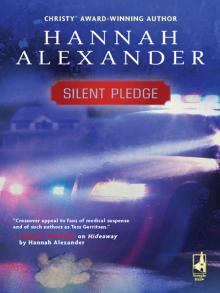 Silent Pledge
Silent Pledge Eye of the Storm
Eye of the Storm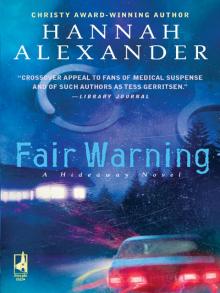 Fair Warning
Fair Warning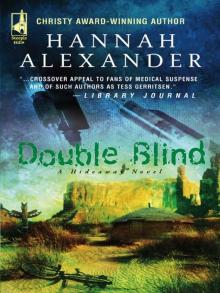 Double Blind
Double Blind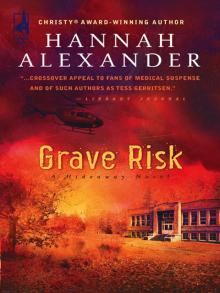 Grave Risk
Grave Risk Hideaway Home
Hideaway Home Death Benefits
Death Benefits Note of Peril
Note of Peril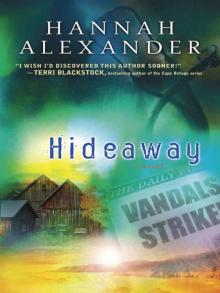 Hideaway
Hideaway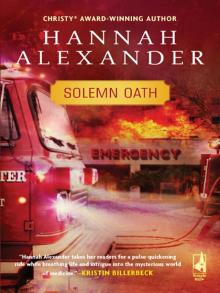 Solemn Oath
Solemn Oath The Wedding Kiss
The Wedding Kiss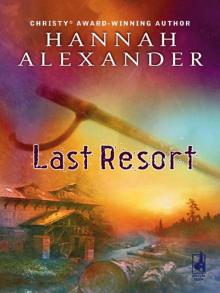 Last Resort
Last Resort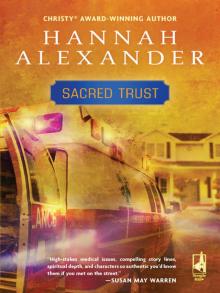 Sacred Trust
Sacred Trust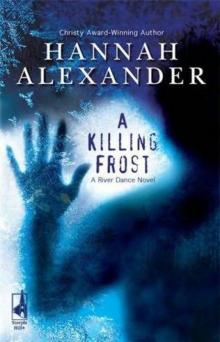 A Killing Frost
A Killing Frost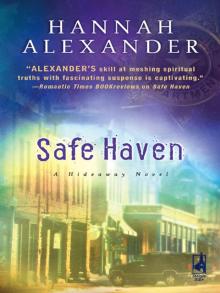 Safe Haven
Safe Haven